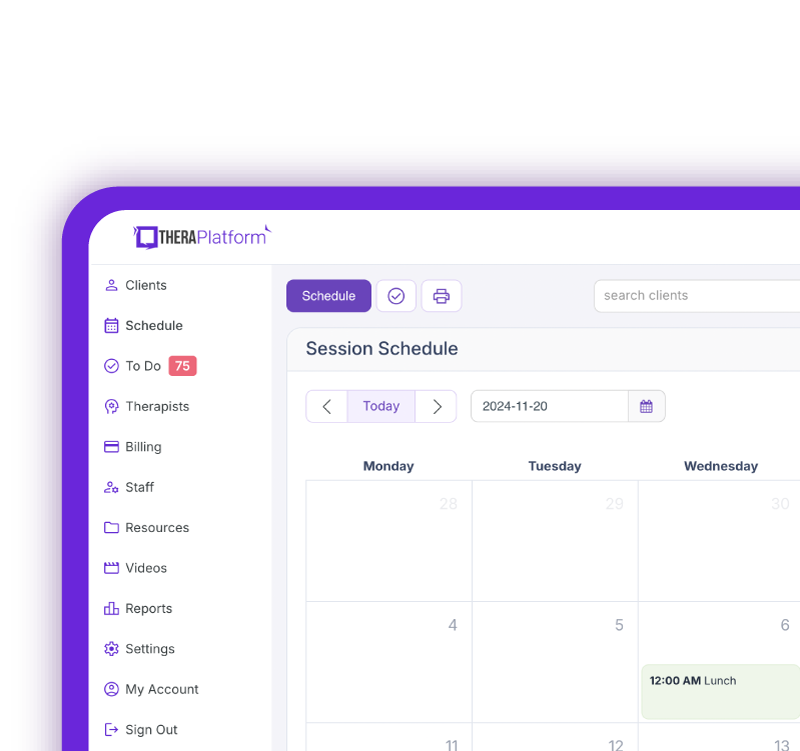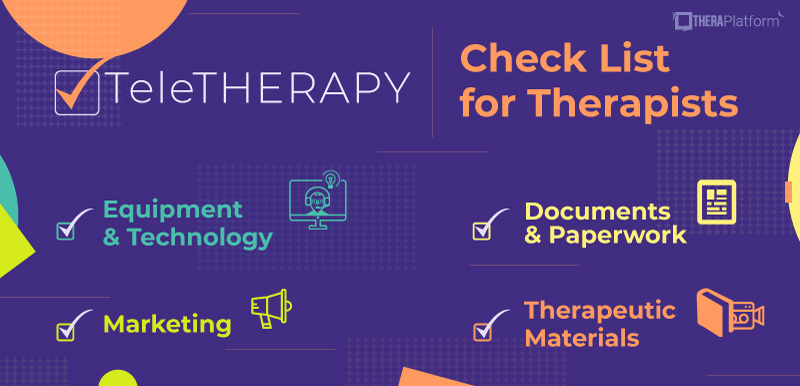HIPAA compliant telehealth platforms

HIPAA compliant telehealth platforms have evolved from a backup option to a primary go-to in healthcare, and maintaining HIPAA compliance remains a top priority.
Summary
- With over 87% of clients reporting satisfaction, telehealth has shifted from a backup option to a primary mode of care, making HIPAA compliance more important than ever.
- Providers must protect Protected Health Information (PHI) at every stage whether in conversations, electronic records, or storage by following strict privacy and security standards.
- Look for telehealth platforms with end-to-end encryption, U.S.-based data storage, client portals, integrated billing, and a signed Business Associate Agreement (BAA).
- Simple safeguards like securing devices, using MFA, avoiding public Wi-Fi, documenting consent, and working in private spaces help therapists avoid costly HIPAA breaches. Enrolling in a teletherapy course for therapists can help providers enhance their knowledge.
→ Click Here to Enroll in My Free On-Demand Top to Bottom Teletherapy Video Course [Enroll Now]
A critical tool for any modern private practice, offering HIPAA compliant telehealth platforms can increase patient access and satisfaction. A study from Digital Health published in 2025 shows that over 87% of clients are satisfied with their perceived quality of healthcare received through telehealth.
Streamline your practice with One EHR
- Scheduling
- Flexible notes
- Template library
- Billing & payments
- Insurance claims
- Client portal
- Telehealth
- E-fax

HIPAA, the Health Insurance Portability and Accountability Act, requires that clinicians provide ethical, secure, and legal care. When it comes to telehealth, choosing a HIPAA-compliant telehealth platform isn’t just a trend; it’s necessary for protecting both your clients and your practice.
What are HIPAA compliant telehealth platforms?
Telehealth that is HIPAA-compliant uses secure, regulated methods to safeguard Protected Health Information (PHI) while providing remote healthcare.
Privacy and security standards set forth by HIPAA must be met not only through the video conferencing tool used, but at every stage of providing healthcare services.
Whether information is exchanged over a messaging app, transmitted during a video call, or stored on a server, HIPAA compliance remains essential.
Practice Management + EHR + Telehealth
Manage more in less time in your practice with TheraPlatform

Understanding HIPAA privacy rules
Under HIPAA’s Privacy Rule, healthcare providers are responsible for safeguarding data that contains PHI – an individual’s identifiable health information. PHI includes a client’s name, contact information, treatment data, locations, and other relevant details. This data can exist in electronic records, conversations, client portals, or other formats.
Under the Privacy Rule, clients have the right to know what health information is being collected about them. Providers must clearly explain what data is gathered, the purpose, and who can access it. Clients must consent if therapists will use their PHI for anything other than treatment, healthcare operations, or payment.
HIPAA security standards and risks
HIPAA Security Standards refer to how an individual’s PHI is protected. The HIPAA Security Rule requires healthcare providers to implement robust administrative, physical, and technical safeguards when it comes to telehealth. Security standards include:
- Administrative safeguards: Policies and procedures that manage security, and include things like providing regular HIPAA training to staff, conducting an analysis of security risks, and establishing a policy for violations.
- Physical safeguards: Measures that protect the physical environment and devices where PHI is stored can include locking computers, following a protocol for handling paper files, and securing the office space.
- Technical safeguards: Security and technology controls used to protect electronic PHI. Encryption is one of the most critical technical safeguards, scrambling data so it is unreadable to others without the proper decryption key.
Failure to protect PHI by not following HIPAA security standards carries significant risks, with penalties ranging from $50,000 to $1.5 million per violation annually, plus potential criminal charges, including imprisonment, for serious breaches.
Watch this video to discover how TheaPlatform elevates Telehealth sessions
Why does HIPAA matter for therapy?
Almost all therapists are considered covered entities under HIPAA, which means that they must adhere to HIPAA laws. Additionally, the privacy and security of PHI are crucial for the success of psychotherapy. Clients will not feel comfortable divulging and addressing their problems if they don’t believe their information will be kept confidential. HIPAA assures clients that they can trust what is happening with their data. When HIPAA is breached, however, the therapeutic relationship is compromised and may never recover.
Legal, ethical, and financial consequences of HIPAA violations
Therapists must do their utmost to uphold HIPAA laws. When the rules are not followed, severe consequences may occur.
Here are some examples:
- For civil violations, the Office of Civil Rights (OCR) can impose penalties from $100 to $1.5 million, depending on the act.
- The Department of Justice (DOJ) can sentence criminal violators with penalties up to 10 years in jail and fines upwards of $250,000.
- Therapists can have their license suspended or revoked by their governing body for breaking ethical obligations.
- Clinicians may face disciplinary action from their employers, including placement on probationary status or loss of their job, with their reputation permanently tarnished.
For those people who feel that HIPAA violations may be overblown, here are a couple of real-world examples in the mental health field:
- In 2023, the mental health startup Cerebral shared the sensitive data of 3.1 million people with third-party advertisers, such as Snapchat and LinkedIn. It also allowed former employees to access user information and exhibited insecure login procedures. For their violations, the Federal Trade Commission (FTC) ordered the company to pay a fine of over seven million dollars.
- On a smaller scale, in 2021, Deer Oaks Behavioral Healthcare experienced a data breach resulting in the online exposure of 35 discharge summaries. It also exhibited an impermissible disclosure of electronic PHI that led to a ransomware attack. The practice was ordered to pay $225,000 by the Office of Civil Rights.
Requirements of HIPAA-compliant video conferencing
Under HIPAA, therapists are obligated to keep client information private and secure. But what are the practical implications for video conferencing? To meet HIPAA requirements, a video platform (and the people that administer it) must adhere to the following criteria:
Technical Safeguards
- End-to-end encryption: Audio and video data is encrypted during transmission and storage to prevent unauthorized access.
- Access controls: Secure passwords, multi-factor authentication, and user permissions are used to restrict access to client data to authorized users.
- Network security: Utilizing firewalls, virus detection, and secure communication protocols.
- Automatic session timeouts: Automatically log off users after a period of inactivity to limit unauthorized access.
Physical Safeguards
- Secure servers: Protecting entry to physical servers and hard drives by limiting access to rooms and buildings.
Administrative safeguards
- Auditing of network activity: Consistent monitoring of activity, including logins, changes in security settings, and network events, in order to detect irregularities.
- Risk assessments: Conducting regular assessments to identify, evaluate, and reduce risks to the privacy and security of electronic protected health information (ePHI).
- HIPAA training: Annual HIPAA training for any individual who is involved in the protection of client health information.
- Incident protocols: Develop detailed plans for how to manage potential breaches in HIPAA laws.
The Business Associate Agreement (BAA)
A BAA is a contract between a HIPAA-covered entity and a business associate that ensures that a person’s PHI is kept private and secure according to HIPAA standards. Business associates can be a single person, such as a billing professional, or a comprehensive telehealth platform, such as TheraPlatform. All video conferencing resources must have a BAA with the covered entity to be considered HIPAA-compliant.
What to look for in HIPAA compliant telehealth platforms
When considering HIPAA compliant telehealth platforms for your practice, look for HIPAA compliance that goes beyond basic video conferencing features.
Technology and encryption standards
Ensure the HIPAA compliant telehealth platforms use “end-to-end encryption”, which ensures data containing PHI is encrypted as it goes from one device to another, and while it is “at rest” (stored on the platform’s servers).
Robust security measures, such as data backup protocols, intrusion detection, and firewalls, are also key.
Vendor location and data storage
Consider where the company and its servers are located – ideally within the U.S. to ensure compliance with U.S. federal and state laws.
Features (Client portal, EMR, billing)
Comprehensive HIPAA compliant telehealth platforms can integrate other features of your workflow, beyond videoconferencing tools. A platform that offers a secure client portal, integrated EMR, and billing system that all protect PHI.
Business Associate Agreements (BAAs)
A BAA is a legal contract between a covered entity (you, the provider) and a business associate (the telehealth platform vendor) that outlines each party’s responsibility in protecting PHI. A BAA should always be signed when using a telehealth platform.
Common HIPAA telehealth violations to avoid
Even when therapists use a compliant platform, HIPAA violations can occur due to human error. Here are some common mistakes to avoid:
- Sharing passwords
- Leaving client records accessible in shared spaces
- Discussing client cases with unauthorized individuals
- Posting PHI online
- Losing unencrypted devices
- Utilizing a vendor without a signed BAA
- Sending PHI through an insecure email, unencrypted messaging app, or text message
- Conducting group sessions without explicit consent from all clients
Free Resources for Therapists
Click below and help yourself to peer-created resources:

Best practices to ensure HIPAA compliance
Following best practices such as these in your daily workflow can help ensure you adhere to HIPAA standards.
Privacy tips
- Work in a private space with the door closed.
- Whether at home or in an office, consider using headphones, privacy screens, and white noise machines.
- Never share information about a client without their permission.
Documentation Do’s and Don’ts
- Do have a clear privacy policy for group therapy sessions? Educate clients on the importance of privacy and prohibit any members from recording or taking photos.
- Document client consent for telehealth services and all other relevant consents, including allowing any third party to be present during a session (such as a family member or interpreter).
- Don’t download software without being aware of its security standards, or use browser extensions that have access to your activity online. IBM Security has reported that healthcare remains one of the most frequent targets for cyberattacks, and data breaches in this sector are higher than in any other industry.
Securing your tech environment
- Enable multi-factor authentication (MFA) on all platforms containing PHI.
- Maintain updates on your operating system, antivirus, and other essential software up to date to protect against cyber threats.
- Never use public Wi-Fi. Instead, use a private, password-protected Wi-Fi network when completing any work-related tasks.
- Use strong, unique passwords or biometric access to secure all devices.
Additional HIPAA resources for therapists
The popularity of teletherapy has exponentially increased. According to the Centers for Medicare and Medicaid Services (CMS), approximately 29% of Medicare users received at least one telehealth service over the year in 2022.
Ensuring HIPAA compliance is essential both for maintaining client trust and fulfilling legal requirements.
While secure HIPAA compliant telehealth platforms like TheraPlatform manages technical security, it’s up to you to follow proper administrative and physical security practices.
For additional guidance on HIPAA compliant telehealth platforms, follow these resources:
- The U.S. Department of Health and Human Services (HHS) offers official HIPAA training and guides.
- Profession-Specific Associations (such as The American Psychological Association and The American Speech Language and Hearing Association (ASHA)): A source for guidelines and resources.
- The American Medical Association: Information on the ethical and practical application of telehealth.
- A HIPAA Compliance Lawyer: Consulting with a legal professional who specializes in HIPAA can help you navigate complex situations and create strong policies for your practice.
- TheraPlatform’s resources, worksheets, and telehealth training via TheraPlatform’s Academy.
Practice Management + EHR + Telehealth
Manage more in less time in your practice with TheraPlatform

Best HIPAA compliant telehealth platforms
The teletherapy industry has grown rapidly since the pandemic, offering safe, convenient, and effective alternatives to in-person care.
To protect client privacy, therapists must use HIPAA-compliant platforms that encrypt video and data while often providing added tools like scheduling, documentation, billing, and client portals.
Leading options include TheraPlatform, Zoom for Healthcare, https://Doxy.me, GoToMeeting, and VSee, each varying in features, integrations, and pricing.
Choosing the best teletherapy platform depends on a provider’s needs and whether that’s a simple video solution or an all-in-one system to manage an entire practice.
Why therapists choose TheraPlatform as their teletherapy platform
Whether for solo practice or larger clinics, therapists choose TheraPlatform for its blend of usability, flexibility, and robust telehealth tools.
Here are top reasons why therapists choose TheraPlatform for teletherapy:
- Efficiency and convenience: Everything down to payments, scheduling, documentation, and insurance claims is managed in one integrated platform, saving time and reducing friction.
- Security and compliance: TheraPlatform is fully HIPAA and PIPEDA compliant, with encrypted video sessions, secure data storage, and 24/7 monitoring for peace of mind.
- Engagement tools: Built-in interactive features like whiteboards, games, media sharing, screen annotation, and therapy-specific “apps” enhance client engagement especially useful in pediatric and speech therapy.
- Client-centered functionality: The secure client portal empowers clients to book sessions, complete forms, submit documents, and make payments, reducing admin work for the therapist.
- Customization and flexibility: Therapists can create and customize templates for notes, treatment plans, and intake forms allowing them to tailor workflows to their practice style.
- All-in-one practice management: Combines telehealth with EHR, billing, insurance, scheduling, and documentation, eliminating the need for multiple tools or software.
- Therapy-specific design: Unlike generic telehealth platforms, TheraPlatform is purpose-built for mental health, speech therapy, OT, PT, and more with features tailored to each specialty.
- Professional credibility: Optional recording features, branded portals, and compliance tools help therapists present a more professional, trustworthy experience to clients.
- Positive user experience: Therapists appreciate having everything in one place and often report a smoother workflow, fewer tech issues, and faster onboarding.
What therapists say about TheraPlatform
Therapists praise TheraPlatform for its ease of use, seamless scheduling, and built-in billing tools like superbills. They value the platform’s features including intuitive charting, customizable notes, and interactive telehealth tools as well as the responsive support team, which listens to feedback and implements updates.
Many highlight that the platform offers the best of all worlds, combining excellent video conferencing with resource sharing and an engaging, client-centered teletherapy experience.
"There's seriously no better platform out there! Easy to use … syncs to your personal schedule, provides superbills …"- Jacqueline S. (Source)
“It is not just the platform, it is the team behind TheraPlatform, always willing to help and receptive to feedback to bring updates requests to live,” Orly, Smarty Therapy PC (Source)
"The video conferencing is excellent and the ability to share resources and the interactive screen make Telehealth a rich experience."- Kathy J. (Source)
"TheraPlatform has been the best of all worlds! … intuitive charting, in-system billing, customizable notes …"-Kendrah B. (Source)
Streamline your practice with One EHR
- Scheduling
- Flexible notes
- Template library
- Billing & payments
- Insurance claims
- Client portal
- Telehealth
- E-fax

Resources
TheraPlatform is an all-in-one EHR, practice management, and teletherapy software built for therapists to help them save time on admin tasks. It offers a 30-day risk-free trial with no credit card required and supports mental and behavioral health, SLPs, OTs, and PTs in group and solo practices.
More resources
- Top-to-bottom approach to launching teletherapy on-demand video academy
- Teletherapy worksheets
- Teletherapy blog
References
Alyahya, R. S. (2025). The satisfaction of clients and caregivers with telehealth speech-language pathology services. Digital Health, 11, 20552076241313163. https://journals.sagepub.com/doi/10.1177/20552076241313163
Ivanova, J., Cummins, M. R., Ong, T., Soni, H., Barrera, J., Wilczewski, H., ... & Bunnell, B. (2025). Regulation and Compliance in Telemedicine. Journal of medical Internet research, 27, e53558. https://www.jmir.org/2025/1/e53558
Odeh, A., Abdelfattah, E., & Salameh, W. (2024). Privacy-preserving data sharing in telehealth services. Applied Sciences, 14(23), 10808. https://www.mdpi.com/2076-3417/14/23/10808
FAQs about HIPAA Compliant Telehealth Platforms
What makes a telehealth platform HIPAA-compliant?
It must use end-to-end encryption, secure U.S.-based data storage, client access controls, and a signed Business Associate Agreement (BAA).
What are common HIPAA telehealth mistakes to avoid?
Sharing passwords, using public Wi-Fi, storing PHI on unsecured devices, or working without client consent can all result in costly violations.
How can therapists protect client data beyond the platform?
Use MFA, work in private spaces, keep devices updated and secured, document consent, and follow administrative and physical safeguards.



